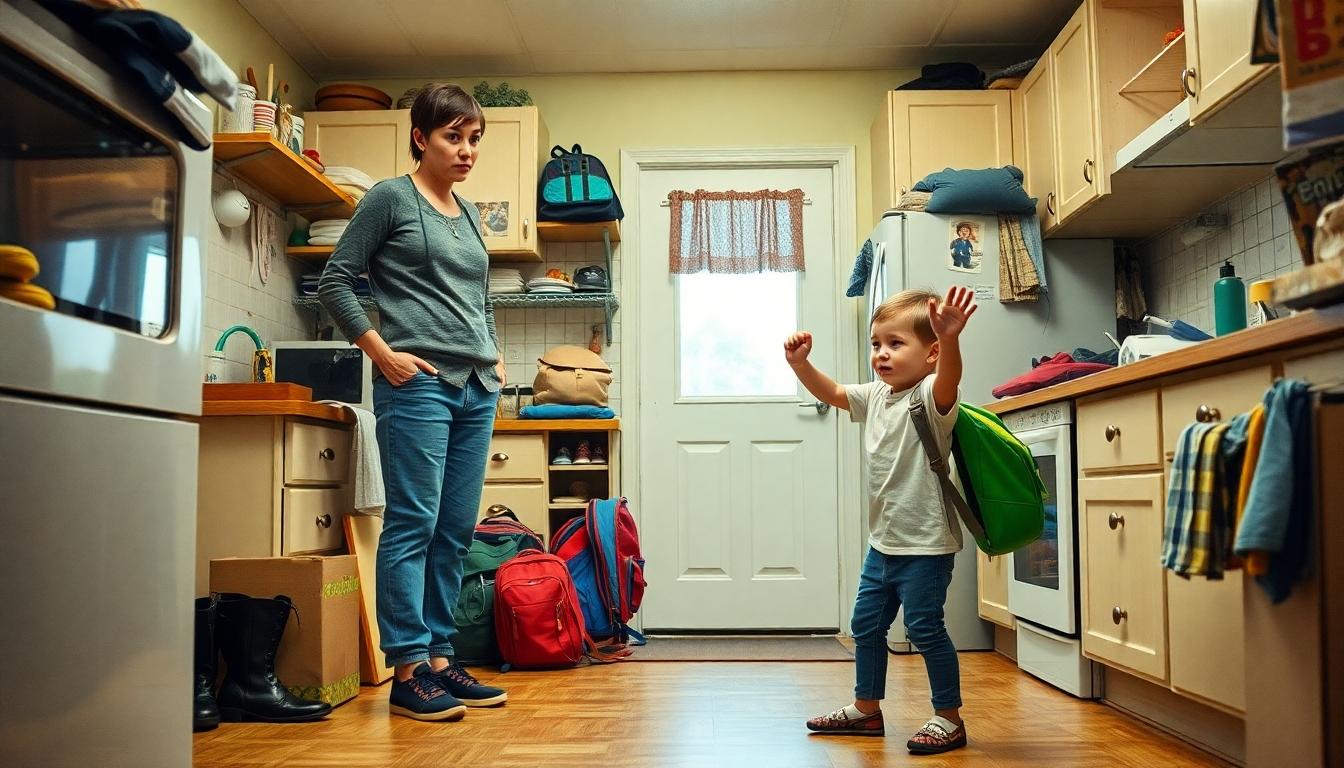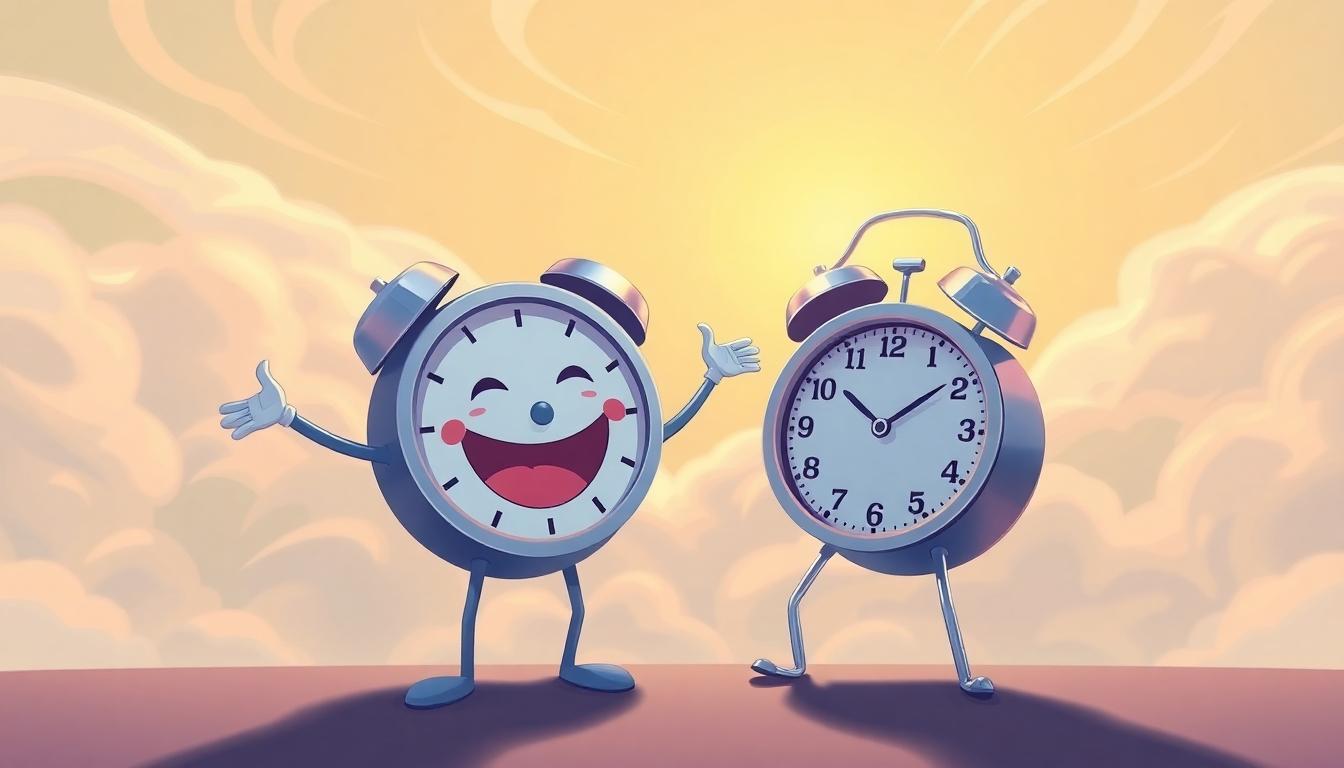Struggling with the biannual clock shuffle? You’re not alone! We’ve all stumbled through that foggy Monday after “springing forward” or enjoyed that extra hour of sleep when “falling back.” These time changes have become a universal experience that’s ripe for humor.
We’ve gathered the funniest time change jokes that perfectly capture the confusion, grogginess, and peculiar situations these clock adjustments create. From daylight saving time memes to witty one-liners about losing sleep, these jokes will have you laughing away those time change blues. Whether you’re a morning person dreading the lost hour or a night owl celebrating the extra snooze time, there’s something here for everyone.
10 Hilariously Relatable Time Change Jokes to Ease Your Clock Confusion
- The Monday Morning Struggle: “I’m not sure what’s worse – the Monday after daylight saving time or regular Mondays. Actually, who am I kidding? They’re both terrible, but at least one gives me an excuse for being late!”
- Time Travel Jokes: “The only time Americans collectively time travel is during daylight saving time. We’re basically Time Lords but without the cool TARDIS or sonic screwdriver.”
- Pet Confusion: “My dog has no concept of daylight saving time, yet somehow he’s still judging me for being an hour late with his breakfast. Those judgmental eyes say it all!”
- Coffee Dependency: “Coffee consumption increases by 400% during time changes. I just made that statistic up, but we all know it’s probably true.”
- Technological Rebellion: “My phone updated automatically, my car didn’t, my microwave is blinking 12:00, and my body thinks it’s some completely different time. It’s not a time change – it’s time anarchy!”
- Sleep Deprivation Logic: “Lost an hour of sleep? No problem. I’ll just make it up by being unproductive at work for the next three weeks.”
- Calendar Confusion: “The week after a time change is when you realize how many clocks you actually own and how few you remember to change. That clock in the guest bathroom has been wrong since 2016.”
- Meeting Mishaps: “Nothing tests a relationship like one person remembering the time change and the other person showing up an hour early or late to brunch.”
- Productivity Claims: “Daylight saving time was created so we could be more productive with extra daylight, yet here I am, using that extra hour of daylight to watch another episode on Netflix.”
When the Clocks Fall Back: Daylight Saving Time Jokes That Hit Too Close to Home

Daylight Saving Time brings a unique blend of confusion and comedy as we adjust our schedules twice a year. These jokes perfectly capture the absurdity of our collective time-changing experience.
Morning Struggles After Springing Forward
Springing forward hits differently than falling back, especially when it comes to our morning routines. “I told my clock it was time to change. It just ticked me off” captures the frustration many of us feel when losing that precious hour of sleep. The transition period can feel particularly brutal during those first few days.
Many people joke that “Springing forward is easy; it’s falling back that gets me every time” – highlighting the strange paradox of how much harder it seems to adjust to gaining an hour than losing one. Our bodies simply don’t appreciate the sudden change in schedule.
Clock humor reaches peak levels during this time, with classics like “Why do clocks always seem so happy during Daylight Savings? They get to spring forward” making light of our collective grogginess. These jokes help us laugh through the brain fog that accompanies the time shift.
The Joy of “Extra” Weekend Hours in Fall
Fall’s time change brings the illusion of bonus time that we all celebrate. “Daylight Savings is like a magic trick: now you see the hour, now you don’t” perfectly describes this strange temporal phenomenon we experience twice yearly. The extra hour of weekend sleep feels like a gift from the time gods.
Comedians often quip that “Daylight Savings Time is like cutting one end off a rug and sewing it to the other end to make it longer” – pointing out the logical fallacy behind the whole concept. This joke highlights how we collectively pretend we’re getting something extra when we’re really just shifting our schedules.
The joy of gaining an hour of sleep becomes a national celebration moment each fall, with social media flooding with memes and jokes about the blissful extra hour in bed. Everyone suddenly becomes a time management expert for exactly one weekend, only to squander the gift entirely.
Time Travel Comedy: The Best Social Media Reactions to Time Changes

Social media platforms become comedy goldmines during time changes, with users across various platforms sharing their frustrations and confusion in hilariously relatable ways.
Twitter’s Funniest Time Change Meltdowns
Twitter users excel at expressing their time change frustrations with sharp wit and concise humor. Microwave clock complaints consistently trend during daylight saving transitions, with tweets like “now I gotta fix the clock on the microwave. it’s literally already dark outside” capturing the collective annoyance we all feel. Directional confusion dominates many Twitter threads, as users debate whether to move “forward an hour or back?” highlighting how widespread this uncertainty truly is. Existential humor also thrives on the platform, with clever wordplay about “losing track of time” or clocks “ticking you off” perfectly merging comedy with our shared exasperation over the biannual ritual.
Instagram’s Clock-Confused Content Creators
Instagram’s visual platform offers unique opportunities for time change comedy that resonates across generations. Creative visual humor flourishes with memes featuring anthropomorphized clocks captioned with phrases like “Meet you at the hour!” or “I’m all wound up!” DIY clock-setting fails generate important engagement, with creators dramatically portraying their struggles to reset analog timepieces, often accompanied by trending hashtags like #DaylightSavingStruggles. Pun-driven content performs exceptionally well, with creators crafting shareable reels featuring clever wordplay like “tock and roll” or referencing a “fortune-teller clock” to maximize audience connection. The platform’s emphasis on relatability ensures content focusing on universal experiences such as mismatched schedules and sleep disruptions receives the most engagement, while absurdist jokes like “Why did the clock join the gym? To stay in shape for daylight saving!” highlight the perceived silliness of our biannual time shifts.
Parents’ Edition: Time Change Jokes About Kids Who Don’t Respect the New Schedule

If you think time changes are rough on adults, parents face an entirely different level of chaos when trying to adjust their children’s schedules.
When Toddlers Reject Your Time-Based Reality
Toddlers operate on their own internal clocks regardless of what any wall clock says. James Breakwell perfectly captured this frustration with his quip: “Wouldn’t it be awesome if kids woke up at 5 a.m. on weekends? –the genius who invented DST.” Parents everywhere nod in exhausted agreement while their little ones rise “at the quack of dawn,” completely oblivious to schedule changes.
Why do toddlers and time changes mix like oil and water? Perhaps because, as many parenting experts note, “Kids don’t care what the clock says.” This reality becomes painfully apparent when you’re trying to explain to a three-year-old why bedtime is suddenly an hour earlier or later. Time change advice for parents often resembles negotiating with tiny dictators who believe time is merely a suggestion.
The classic joke “How do you know if your clock is crazy? It goes ‘cuckoo'” perfectly describes the erratic schedules parents endure post-time change. While adults struggle with adjustments, toddlers simply continue their regularly scheduled programming—regardless of what any fancy government-mandated time shift might suggest.
School Morning Chaos After Clock Changes
School mornings following time changes transform otherwise functional households into scenes of pure mayhem. Parents everywhere relate to the sentiment “When the time changes, I hunt for lost hours” as they frantically search for shoes, backpacks, and permission slips while everyone runs behind schedule.
The morning rush intensifies when kids resist the new routine with the same determination as the joke: “I tried to set my watch back, but it refused.” Children’s internal clocks don’t reset with a simple button push, leaving parents to manage the fallout of overtired, confused, and particularly ornery youngsters trying to function in their academic environments.
Parents attempting to maintain order might relate to clock-based humor like “Why did the clock join the band? It couldn’t handle tempo changes.” The irregular rhythms of post-time change mornings leave everyone feeling off-beat and discombobulated. School drop-off lines become filled with bleary-eyed parents who’ve spent the previous hour repeating “We need to hurry” to seemingly deaf ears.
The parental battle cry of “Spring into action” represents the futile hope for smoother transitions, while the reassurance “You can count on me” becomes ironically appropriate when punctuality goes out the window during these biannual disruptions. Time changes reveal the truth that while adults may operate on clock time, children run on their own schedule—and no government mandate will convince them otherwise.
Workplace Time Change Jokes That Every Professional Will Understand

Time changes affect workplaces in uniquely humorous ways. Here are some time change-themed jokes that’ll resonate with professionals everywhere:
- Clocking In Late: Why did the employee’s clock go to therapy? It had too many time changes to handle.
- Timing Is Everything: What did the clock say when it was asked to join a team? “I’m all about working together on time!”
- Pressure of Time: Why do clocks hate being late? They can’t stand the pressure of time.
- Spring Forward: “I love Daylight Saving Time!” – No one ever.
- Lost Track of Time: What did the clock say when it was late? “I lost track of time!”
Monday Meeting Mishaps After Daylight Saving
Monday meetings after a time change create the perfect storm for workplace confusion and comedy. The combination of sleep deprivation and calendar chaos makes for memorable meeting moments.
“Don’t forget to adjust all the clocks you never look at because you have a phone!” This reminder perfectly captures the irony of our digital age where most time displays update automatically, yet we still scramble to change that one kitchen appliance.
Parents in the workplace face additional challenges during these transitions, as evidenced by the observation that “the end of daylight savings time means a week of waking up early because kids and pets can’t tell time.” This perfectly encapsulates the struggle of maintaining professional composure while dealing with household chaos.
The “I’m Actually On Time” Phenomenon
After time changes, simply arriving at meetings on schedule becomes an achievement worthy of celebration. Punctuality transforms from an expectation to a surprising accomplishment.
Clock-related humor highlights this peculiar post-time-change reality. Why was the clock always invited to parties? It knew how to keep the time lively! This joke reflects how valued proper timing becomes in the workplace after everyone’s schedules have been disrupted.
Similarly, the question “Why did the clock always win arguments?” with its answer “It had the best timing!” resonates with professionals who understand that delivering information at the right moment can make all the difference, especially when everyone’s internal clocks are recalibrating.
Pets Who Can’t Comprehend Time Change: A Comedic Collection

Our furry companions provide some of the most hilarious reactions to daylight saving time adjustments, completely oblivious to why their humans suddenly change their routines twice a year.
Confused Cats and Their Feeding Schedules
Cats are notorious creatures of habit who become hilariously perplexed when daylight saving time disrupts their perfectly timed feeding schedule. Their internal clocks remain steadfastly unchanged even though what your wall clock says. Every cat owner knows the feeling of being stared at intensely an hour before the “new” feeding time, with their feline friend seemingly asking, “Has the concept of time completely escaped you, human?” Vocal protests often follow this confusion, with cats meowing persistently as if to say, “The clock may have changed, but my stomach didn’t get the memo.” Felines will pace around food bowls, dramatically flop on the kitchen floor, or even attempt to wake their owners at the “correct” time according to their unchangeable internal schedule. The determination in their eyes when they’re convinced you’ve simply forgotten to feed them demonstrates their complete rejection of our human time-altering shenanigans.
Historical Time Change Jokes: How Humor About Clock Changes Has Evolved

Time change humor has deep historical roots, dating back to Benjamin Franklin, who jokingly suggested a seasonal time change in 1784. Interestingly, Franklin wasn’t actually proposing changing clocks but rather advocating for people to wake up earlier in summer months to conserve candlelight. This playful approach to time adjustment represents perhaps the earliest “time change joke” in recorded history.
Over the centuries, our collective sense of humor about clock changes has evolved alongside our timekeeping practices. Daylight Saving Time (DST) implementation created fertile ground for jokes that capture the frustration, confusion, and absurdity we all experience during these biannual adjustments. Classic clock-related punchlines often rely on clever wordplay, such as “Why did the clock go to school? It wanted to improve its timing.”
Witty clock personification became a staple of time change humor, giving voice to our inanimate timekeepers. “What did the clock say to the alarm? You’re always waking me up!” represents the kind of anthropomorphic jokes that remain popular today. Friendship-themed clock jokes also resonate with many, like “Why do clocks make terrible friends? They always seem to be ticking you off!”
Social media platforms have revolutionized how time change jokes spread and evolve in modern times. The annual rituals of “springing forward” and “falling back” now generate waves of memes, witty observations, and shared commiseration across digital spaces. These contemporary jokes build on historical foundations while addressing modern time-related anxieties about lost productivity, disrupted schedules, and technological confusion.
Today’s time change humor increasingly reflects our complicated relationship with time in a fast-paced, always-connected industry. We’ve moved from simple puns about clocks to more complex social commentary on how these arbitrary adjustments impact our sleep, work, and daily routines. Yet the fundamental purpose remains unchanged: using humor as a coping mechanism for the disorientation these time shifts inevitably cause.
International Perspectives: Time Change Jokes From Around the World

Time change humor transcends borders, with different cultures adding their unique spin to daylight saving jokes. Across the globe, people cope with clock adjustments through laughter, creating jokes that reflect their cultural perspectives on time shifts.
American Time Change Comedy
Americans often rely on clever wordplay and situational humor when joking about daylight saving time. Their approach typically includes punny one-liners that play with clock terminology. “Why did the clock go to school? It wanted to improve its timing!” represents the lighthearted approach many U.S. residents take toward time changes. Another popular American joke asks, “What did the clock say to the alarm? You’re always waking me up!” – perfectly capturing the frustration many feel during time adjustment periods.
British Clock Humor
British time change jokes showcase their distinctive dry wit and sarcasm, making them instantly recognizable. Their humor frequently centers around the chaos and confusion that ensues when clocks change. TikTok and other social media platforms have become popular venues for British comedians to share sketches about people showing up at wrong times or completely forgetting about the time change altogether. We’ve noticed British humor tends to embrace the absurdity of changing clocks twice yearly with a particularly skeptical tone.
Global Time Change Themes
Several universal themes appear in time change jokes regardless of geographic origin:
- Confusion narratives dominate global time humor, with jokes about people arriving too early or late for appointments
- Wordplay and puns involving “springing forward” or “falling back” cross cultural boundaries
- Complaints about sleep disruption unite people worldwide through relatable humor
- Social commentary on the perceived usefulness (or uselessness) of daylight saving appears in jokes across different countries
Though the exact jokes may vary from country to country, the underlying experience of collective disorientation creates a shared comedic language that helps us all cope with these biannual time shifts. Time change jokes eventually serve as a universal reminder that sometimes the best response to life’s inconveniences is simply to laugh about them.
The Best Time Change Jokes to Share at Your Next Gathering

Looking for some laughs to break the ice about daylight saving time? We’ve compiled the perfect collection of time change jokes guaranteed to tick all the right boxes at your next gathering.
Clock Jokes That Never Get Old
Clock-related humor resonates perfectly during time changes. “Why did the clock go to therapy?” It had too many time changes to handle! Clocks make fantastic comedy subjects because everyone can relate to their persistent ticking. “Why don’t clocks play poker?” They can’t handle the time change!
Daylight Saving Zingers
Daylight saving time provides endless comedy material. One classic comparison states that “Daylight Savings Time is like cutting one end off a rug and sewing it to the other end to make it longer.” This perfectly captures the absurdity of the whole concept! People instantly connect with this imagery because it highlights how we’re not actually creating more daylight, just shifting it around.
Relationship Humor
Time devices offer surprising relationship comedy potential. “Why did the clock break up with the calendar?” works as an excellent setup that lets your friends create their own punchlines. Conversations about time often spark creative responses and encourage participation from everyone at your gathering.
Clock Conversations
Imagined dialogues between timepieces always generate smiles. “What did the clock say to the alarm? You’re always waking me up!” These personification jokes work wonderfully because they give human traits to the devices measuring our days. Another crowd-pleaser asks, “Why do clocks make terrible friends?” The answer: “They always seem to be ticking you off!”
End-of-Day Humor
Tired clock jokes perfectly capture post-time change exhaustion. “What did the clock say after a long day? I’m all wound up!” This type of wordplay connects with anyone feeling the effects of schedule disruption after springing forward or falling back.
Ironic Quotes About Time Changes
Sarcastic statements often get the biggest laughs during time change seasons. “I love Daylight Saving Time!” – said no one ever. These ironic comments acknowledge the collective frustration many feel about clock adjustments. Another popular quote jokes: “Thanks to Daylight Saving Time, we all get an extra hour to think about doing something productive,” which humorously acknowledges how most people actually spend their “extra” hour.
Why Time Change Jokes Never Get Old, Even When We Do
Time change jokes stand as perfect reminders that we’re all in this twice-yearly confusion together. Whether you’re struggling with sleepy kids begging for “five more minutes” or watching your cat demand breakfast at what they consider the correct time we can all find comfort in shared laughter.
Next time the clocks change remember to arm yourself with these jokes. They won’t fix your body clock or help you reset your microwave but they’ll certainly make the transition more bearable.
So keep laughing at the absurdity of it all and remember: no matter how disoriented you feel there’s always someone out there who forgot to change their alarm and showed up an hour early to an empty office.
Frequently Asked Questions
Why do we change our clocks twice a year?
We change our clocks twice a year due to Daylight Saving Time (DST), which was implemented to make better use of daylight. The practice shifts an hour of daylight from morning to evening during summer months by moving clocks forward in spring (“spring forward”) and back in fall (“fall back”). Though originally intended to conserve energy, its effectiveness and necessity remain debated topics in many countries.
How can I help my body adjust to the time change?
Adjust gradually by shifting your sleep schedule by 15-20 minutes each day for several days before the change. Maintain a consistent sleep routine, get morning sunlight exposure, limit caffeine and alcohol, and avoid screens before bedtime. Exercise regularly, but not too close to bedtime. Stay hydrated and give yourself grace—it typically takes about a week for your body to fully adjust.
Why do I feel more tired when we “spring forward”?
When we “spring forward,” you lose an hour of sleep, disrupting your circadian rhythm. This sudden change forces your body to wake up earlier than it’s accustomed to, resulting in sleep deprivation. Your internal clock needs time to synchronize with the new schedule. This disruption affects hormone production, particularly melatonin and cortisol, leading to that trademark grogginess and fatigue.
How do I help my kids adjust to time changes?
Start adjusting their bedtime by 10-15 minutes each day for about a week before the time change. Maintain consistent routines for meals, naps, and bedtime. Ensure they get plenty of natural light in the morning and physical activity during the day. Limit screen time before bed and create a calm sleeping environment. Be patient—children often take longer than adults to adjust.
Why do pets get confused during daylight saving time?
Pets get confused during time changes because they operate on internal biological clocks rather than human-made schedules. They can’t understand why their feeding, walking, or playtime routines suddenly shift by an hour. Animals are creatures of habit who rely on consistent patterns. This sudden disruption can cause temporary behavioral changes like restlessness, confusion about meal times, and changes in activity levels until they adjust to the new routine.
Does daylight saving time actually save energy?
Research shows mixed results regarding energy savings from daylight saving time. While it was originally implemented to reduce evening electricity usage for lighting, modern studies indicate minimal energy benefits. Some research even suggests increased energy consumption due to greater air conditioning use during longer, warmer evenings and additional heating needs in darker mornings. The energy-saving benefits vary by region, climate, and lifestyle patterns.
How long does it take to adjust to daylight saving time?
Most people adjust to the time change within a few days to a week. However, individual adaptation varies based on factors like age, overall health, and sleep habits. The spring transition (losing an hour) typically causes more disruption than the fall transition (gaining an hour). Some studies suggest that certain individuals may take up to three weeks to fully synchronize their internal clocks with the new schedule.
Which countries don’t observe daylight saving time?
Most countries near the equator don’t observe daylight saving time because daylight hours remain relatively consistent year-round. Countries that have abolished DST include Russia, China, Japan, India, and most of Africa. Some notable exceptions where only portions of countries observe DST include Australia, Brazil, and Canada. Hawaii and Arizona (except the Navajo Nation) are U.S. states that don’t participate in the biannual clock changes.
Are there health effects associated with time changes?
Research has linked time changes, particularly the spring transition, to various short-term negative health effects. Studies show increased rates of heart attacks, strokes, and traffic accidents in the days following the “spring forward” change. Sleep disruption can also temporarily impact mental health, concentration, productivity, and immune function. These effects typically resolve as the body adapts to the new schedule.
Will daylight saving time ever be eliminated?
Many regions are considering eliminating biannual time changes due to mounting evidence of negative impacts on health, productivity, and safety. The European Union has approved a directive to end mandatory time changes, though implementation has been delayed. In the United States, the Sunshine Protection Act, which would make daylight saving time permanent, has gained support but hasn’t been fully enacted. The debate centers on whether to maintain standard time or daylight time permanently.







